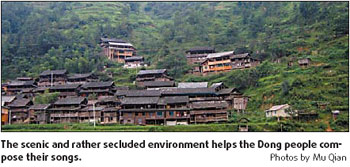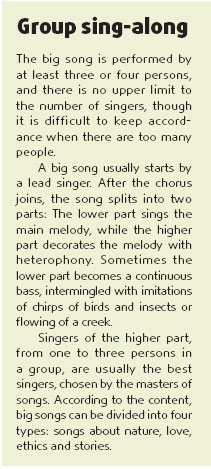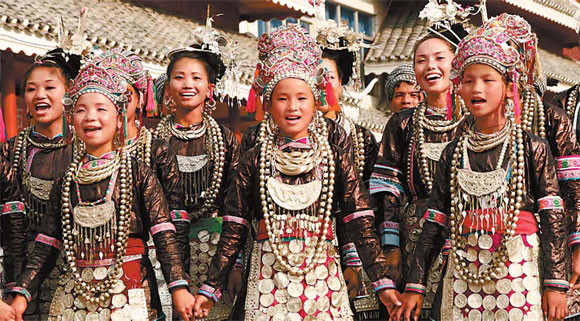Good vibrations
|
Dong people living in Guizhou Province always have music in their hearts. Zhang Jing |
Imagine a chorus singing in the mountains, accompanied by the sounds of the wind, river and the chirping of birds and insects. Imagine a people who have lived with such music for more than 1,000 years.
Then it's easy to understand why the "big song" of the Dong people is called "harmonics of men and nature", and the meaning of lyrics such as "life is short, and it is a pity if you don't sing". For them, songs are related to nature, history, love, friendship, and every phase of life.
In the joint areas of Southwest China's Guizhou Province, Central China's Hunan Province and South China's Guangxi Zhuang Autonomous Region, the beautiful and rather secluded environment has helped the Dong people create and maintain their big song (da ge in Chinese, ga lao in Dong language), a kind of chorus sung in different parts without instrumental accompaniment.
Description of the Dong's big song can be found in the works of ancient poet Lu You (1125-1209), while records of its early forms appeared in more ancient literature.

The big song is for every age group of the Dong people. There are song teams of young children, teenagers, and senior people. Young men and women form different song teams and sing antiphonal big songs in the drum tower, a place for people to meet in the Dong villages. Antiphonal singing involves alternate singing by two choirs or singers.
"Like many others, I met my wife through singing big songs, when I was 14 or 15," says 65-year-old Wu Yingqing, a well-known singer from the Yandong Township of Liping County, Guizhou Province. "At that time her and my song teams often gathered to sing antiphonal songs."
Born into a family known for producing good singers, Wu began to listen to the singing of his father since he was a baby.
His father, who passed away in 2003 at the age of 90, was a famous geshi, or master of songs, a respectful title for great singers who are in charge of teaching young people to sing. Wu's father still taught people to sing not long before the end of his life.
"The Dong people sing throughout their lives," says Wu, who is also a master of songs. "We are busy farming for nine months of a year, and we sing in the other three months, especially during the lunar New Year when people gather to sing for whole nights."
Wu says a master of songs teach young people the lyrics first, and then the music, both orally as they were passed down from the ancestors. As the Dong people did not have a written language, singers must learn all the lyrics by heart.
The students do not pay their teachers, but usually express their gratitude by helping teachers farm and weed their fields. They also send teachers homemade dishes at festivals.
Because of the isolation and slow economic development in the Dong people's area, the big songs have remained untouched and unknown for a long time. Since the second half of the 20th century, big songs are becoming gradually known by the outside world.

In 1953, Wu Yingqing's sister Wu Peixin and three other young women from Liping performed big songs in Beijing for the first time. Wu Peixin was also the first Dong singer to perform outside of China, in Democratic People's Republic of Korea in 1953 and in the former Soviet Union in 1957.
The big songs became known internationally when nine young women from Liping and Congjiang counties of Guizhou were invited to perform at the Festival D'Automne a Paris in 1986.
"It was something big. Most officials in our county hadn't been on an airplane yet at that time, and we were," says 44-year-old Wu Yilan, one of the nine singers who performed in Paris. They performed abroad again in 1988, touring Italy, Hungary and Austria.
Though much envied by their countrymen, these experiences did not change their lives very much. When the performances were over, most of the singers went back to their normal lives.
Not used to the work the government assigned to her at the local Family Planning Office, Wu Yilan ran a restaurant for a period of time, and is now a housewife in Liping.
Singing did not become a job for Wu Yilan, but it is a lifelong vocation for her, as for all the Dong people. She is a member of a middle-aged song team in Liping now, and is often invited to perform at local events. When she goes back to her home village, she still joins her old friends to sing big songs, sometimes throughout the night.

A younger generation of singers continues to promote big songs. In August 2006, a team of big song singers called Cicada Song Group participated the 12th CCTV Young Singers' Competition, and won the silver award.
Lead singer of the group, 25-year-old Wu Jizhen was not satisfied being a traditional master of songs, and is now studying vocals at the Guizhou University. "For the Dong people, the big songs are not only entertainment, but something indispensable," she says. "I hope I can study big songs and minority music more comprehensively so that I will be able to teach more people about our culture."
What Wu Jizhen faces is a different environment now. Today, most young people in the Dong area have left their homes to work in the factories of the more-developed East China to make a better living. Basically only senior people and children stay at Dong villages now, and the time when young people gathered to sing big songs every night is gone.
In 2003, a "Project of Preserving Big Songs of the Dong People" was started by Deng Minwen, a retired Dong scholar of literature from the Chinese Academy of Social Sciences.
Besides compiling books, the project established bases of big songs in kindergartens, primary and middle schools of Liping in order to help the transmission of big songs through school education. In addition, Deng is planning to organize song teams in some factories in Guangdong Province where Dong workers are concentrated.
"Our lifestyles have changed a lot, and so will the big song, but as long as we love the big song it won't disappear," he says.
(China Daily 09/18/2007 page19)















